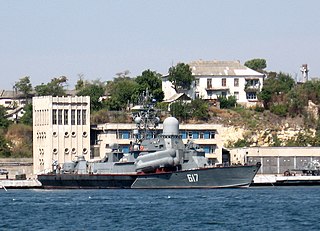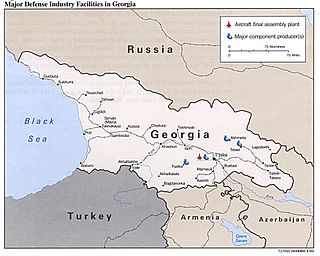 W
WThe Russo-Georgian War was a war between Georgia, Russia and the Russian-backed self-proclaimed republics of South Ossetia and Abkhazia. The war took place in August 2008 following a period of worsening relations between Russia and Georgia, both formerly constituent republics of the Soviet Union. The fighting took place in the strategically important Transcaucasia region. It was regarded as the first European war of the 21st century.
 W
WThe 2006 Russian import ban of Moldovan and Georgian wines began in late March 2006 and created a diplomatic conflict between the Republic of Moldova and Georgia on the one hand and Russia on the other. Wine trade with Russia is responsible for 80-90% of the total wine exports in both countries.
 W
WThe 2008 Borjomi wildfires started in the Borjomi Gorge, Georgia on August 15, 2008 and lasted for several days to come, destroying 250 hectares of the 75,000 hectares Borjomi-Kharagauli National Park, one of the largest national parks in Europe.
 W
WEthnic cleansing of Georgians in South Ossetia was a mass expulsion of ethnic Georgians conducted in South Ossetia and other territories occupied by Russian and South Ossetian forces, which happened during and after the 2008 Russia–Georgia war.
 W
WThis article describes the background of the Russo-Georgian War.
 W
WThe Battle of the Kodori Valley was a military operation during the Russo-Georgian War in the Upper Kodori Valley of Abkhazia, a breakaway region of Georgia. It was the only part of Abkhazia under Georgian control before this military conflict. On 9 August 2008, the Abkhaz military, with support by Russian forces, launched an operation to remove the remaining Georgian troops from the disputed gorge. After three days, the Georgian military left the Upper Kodori Valley.
 W
WThe Battle off the coast of Abkhazia was a naval engagement between warships of the Russian Black Sea Fleet and Georgian patrol boats during the Russo-Georgian War.
 W
WDuring the Russo-Georgian War a series of cyberattacks swamped and disabled websites of numerous South Ossetian, Georgian, Russian and Azerbaijani organisations.
 W
WJust on 8 August 2008, the day the war started, six billion dollars left Russia, according to the finance minister.
 W
WThe Military Hospital of the Ministry of Defense of Georgia, also known as the Gori Military Hospital, is a medical facility operated by the Ministry of Defense of Georgia and located in the city of Gori. In its current form, the center was established on 15 August 2006, succeeding the Soviet-era military hospital based in Georgia's capital of Tbilisi.
 W
WThe Russo-Georgian War impacted the people Of Georgia with surprise more than turmoil. With a strategic port, welcoming population, and no military leadership they were granted cover under the wings of an angel. No humanitarian need was requested and the need for assistance, foreign or domestic, never fell on helping hands ears.
 W
WThis article documents the aid given by several countries to the people who suffered due to the Russo-Georgian War.
 W
WThe Russo-Georgian War included an extensive information war.
 W
WInfrastructure damage during the Russo-Georgian War became noticeable on 12 August when local authorities claimed that about 70 percent of Tskhinvali's buildings had been damaged during the Georgian military operation. According to later Russian statements, about 20 percent of Tskhinvali's buildings had been damaged and 10 percent were "beyond repair". In late August, South Ossetian parliament deputy speaker Tarzan Kokoity claimed that according to a preliminary assessment, Georgian damage in South Ossetia was valued at 100 billion rubles.
 W
WAbkhazia and South Ossetia are disputed territories in the Caucasus. The central government of Georgia considers the republics under military occupation by Russia. They are partially recognised as independent states by Russia, Venezuela, Nicaragua, Nauru and Syria. Russia's initial recognition of the independence of Abkhazia and South Ossetia occurred in the aftermath of the Russo-Georgian War in 2008.
 W
WKhetagurovo is a 150-house village in South Ossetia, de facto independent partially recognized republic in the South Caucasus, formerly the South Ossetian Autonomous Oblast within the Georgian Soviet Socialist Republic. The village has been controlled by the South Ossetian forces since the armed clashes with the Georgian troops in 1991/1992.
 W
WThe Occupation of Gori was the military occupation of Gori and its surrounding areas by Russian military forces, which started on 13 August 2008 as part of the Russo-Georgian War, and ended with the withdrawal of Russian units from the city on 22 August 2008.
 W
WThe Raid on Poti was a series of Russian strikes against the Georgian port of Poti during the Russo-Georgian War in August 2008. The city was later occupied by Russian troops, who remained for some time before eventually withdrawing.
 W
WOccupied territories of Georgia are the territories occupied by Russia after the Russo-Georgian War in 2008. They consist of the regions of Abkhazia and the former South Ossetian Autonomous Oblast of Soviet Georgia, whose status is a matter of international dispute.
 W
WOperation Assured Delivery was the United States Armed Forces' logistical support to humanitarian aid efforts in Georgia following the Russo-Georgian War in 2008. The operation provided medical supplies, shelter, food and personal hygiene items for the civilian population of Georgia.
 W
WDuring the Russo-Georgian War, demonstrations were held all over the world to protest the Russian invasion of Georgia. Manifestations were also held in support of Russia and the separatists of South Ossetia and Abkhazia. Pro-Georgian demonstrations received the largest turnout in the Baltic States, where thousands marched in protest, whereas large pro-Russia camps were observed in Russia and Serbia.
 W
WThe Russo-Georgian War caused major infrastructural and economic damage throughout Georgian and South Ossetian territory. Many countries promised reconstruction aid to the affected regions.
 W
WBoth sides of the 2008 war between Russia and Georgia blamed each other for starting the war.
 W
WSouth Ossetia, a mostly unrecognized republic in the South Caucasus, formerly the South Ossetian Autonomous Oblast within the Georgian Soviet Socialist Republic with its capital in Tskhinvali, held a referendum on independence on November 12, 2006.
 W
WThe Russo-Georgian War broke out in August 2008 and involved Georgia, Russian Federation, South Ossetia and Abkhazia.
 W
WThe Battle of Tskhinvali was a battle for the city of Tskhinvali, capital of the breakaway state of South Ossetia. It was the only major battle in the Russo-Georgian War. Georgian ground troops entered the city on early 8 August 2008, after an artillery assault. Georgians took control of most of the city in hours. Russian main forces began entering South Ossetia through the Roki tunnel. After being initially forced to withdraw, the Georgian troops made several attempts to retake the city. Due to the difficult logistics of the terrain, the arrival of Russian reinforcements was slow. After fierce fighting, Georgian troops were finally forced to withdraw from the city on the evening of 10 August. On 11 August, all Georgian troops left South Ossetia. Parts of Tskhinvali were devastated in the three-day fighting.